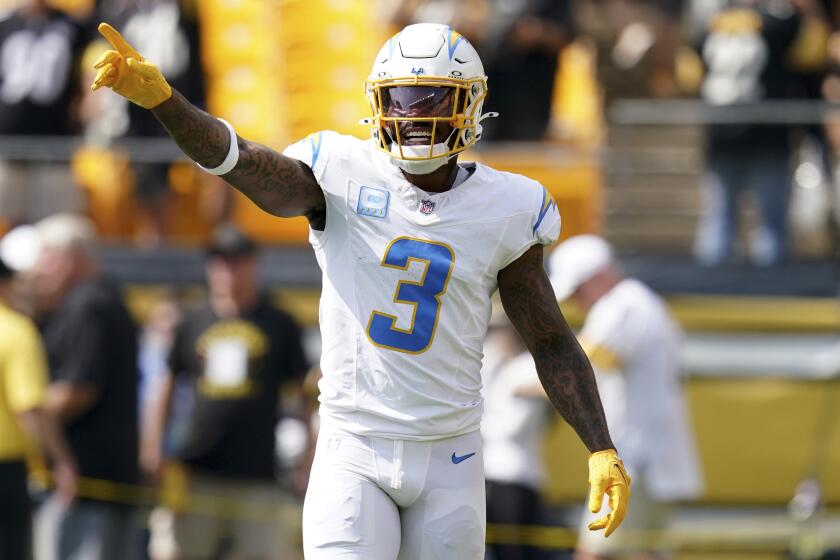Ripken Vs. Age-Old Question
Nobody is doing anything bad to Cal Ripken Jr. So, everybody just ought to relax.
The evaluation of aging stars, on a tolerably fair basis, is one of the things that deliberate, daily old baseball does best. Few in the Hall of Fame ever got short shrift at the end. A firm nudge toward the door, maybe. But a really raw deal? Doesnāt happen. And it wonāt to Ripken. If he can still play, heāll get to prove it. Over 162 games, everybody gets more than enough chances. If he canāt, then itās time to go. Because heās a Ripken, heāll know which is which.
Last weekend, Manager Mike Hargrove informed Ripken that, instead of being the starting third baseman with occasional days off, he would play two to five games a week, depending on how he hits. In one sense, it is a stunning demotion. The man who once started 2,632 consecutive games now has to look at the lineup card every day, even if heās in perfect health and fresh as a daisy. In fact, Ripken hit a three-run homer on Wednesday night and then found himself on the bench for Thursdayās 8-2 loss to the Tigers.
Thatās how it goes when youāre 40, have missed nearly half of the games in the previous two seasons with injuries and are batting .161. And thatās exactly how it should go.
āIām not ready to say, in my own mind, that I canāt do it any more,ā Ripken said on Wednesday. āIām encouraged by the way I feel physically.
Baseball has its rituals of initiation, celebration and termination. Ripken has gone through the first two. And heāll certainly endure the third as well. Whether it will happen soon is unknowable. But it will be done according to baseballās immutable, if unwritten codes--the very ones Ripken has always lived and played by. The game has its century-old ways of reaching its verdicts. They are not always correct. But theyāre close enough. Those who breathe and bleed the sport, like Ripken and Hargrove, have no trouble abiding by them.
āIn an ideal situation ... you know you have the security to play every day. The reality is thatās not the case (now),ā said Ripken. āAt this stage after the injury and everything else, the situation is what it is.ā
Former manager Earl Weaver once said that of all the great Oriole players heād managed, every single one caused an internal team fuss and accused him of being unfair at The End. They couldnāt face the truth with grace. āExcept Brooks Robinson,ā said Weaver. āAnd heās the one who could have caused the most trouble of all.ā
Ironically, Robinson was Ripkenās childhood baseball hero.
At the moment, Hargrove wants to see more of Mike Kinkade, a mildly promising prospect, at third base. The bad news about Kinkade is heāll be 28 years old next month and he has only 57 career at-bats in the major leagues. So, how good is he likely to be? On the other hand, he did well for the gold medal-winning U.S. Olympic baseball team last September, has a .335 batting average in the minors in 2,357 at-bats, though with modest power. So, how bad can he be?
In recent years, virtually every Oriole personnel decision has been tinged, or tarnished, by some element of Warehouse intrigue. The desire to Take Credit among the brass often reaches comical proportions. Kinkade was part of the Mike Bordick trade that began the Oriolesā breakup last July. So, before this saga ends, Hargrove may have to resist both a bit of pro-Kinkade pressure, and even a hint of anti-Cal sentiment from on high.
Still, if any player ever had the leverage to defend himself in the big league in-fighting, itās Ripken. So, donāt worry about him.
In one fascinating respect, Ripkenās case is different from almost any other 40-year-old future Hall of Famer in the history of baseball. It is only mildly hyperbolic to say that Ripken never reached his full potential as a hitter until batting coach Terry Crowley came aboard two seasons ago. Perhaps no great players had such mediocre mechanics for so long or made such a rapid improvement so late.
Former big league manager Gene Mauch, watching Ripken in his prime, noted how he used wonderful hand-eye coordination and savvy guess-hitting to overcome poor technique. āSomeday, heāll have the worst swing in Cooperstown,ā he said.
Over the past two seasons, despite a serious back injury in ā99 and the aftereffects of back surgery in 2000, Ripken came to the plate 641 times--a typical one-season total in his prime. He had 33 homers, 43 doubles, 113 RBI and a .300 average. In other words, when he could play--even in pain or when rusty -- he put up the same kind of numbers heād produced in his MVP seasons.
Radar measured his bat speed as the fastest of his career and easily the quickest on the team. When even half healthy, the hardest Oriole to throw a 98 mile per hour fastball past was Ripken. Last year, Ripken had 15 homers and 56 RBI in 309 at-bats--legitimate per-at-bat power statistics for a third baseman.
So, all of Ripkenās quotes this week should be heard in this unique context. Until he broke a rib in the offseason (probably playing basketball), thus losing a month of spring training, Ripken wasnāt just anticipating some modest graceful decline into retirement. For the first time since Crowley arrived, he expected to play pain-free. What were his hopes? He never says. But they were high.
āUltimately, the proof is in the pudding when you stand in the box,ā Ripken said on Wednesday before going out and hitting his first homer of the season. Oh, that also gave him the team RBI lead with nine. āIf I didnāt think I could (contribute), I wouldnāt be back. ... Youāre here, you canāt turn your back on it and say, āOK, this sliver (of the season) was enough to convince me I canāt do it.ā Iām not there yet.ā
Nobody knows how this will end. But everybody gets a guess. Hereās mine. Take a chill pill. This is going to work out just fine.
More to Read
Go beyond the scoreboard
Get the latest on L.A.'s teams in the daily Sports Report newsletter.
You may occasionally receive promotional content from the Los Angeles Times.










